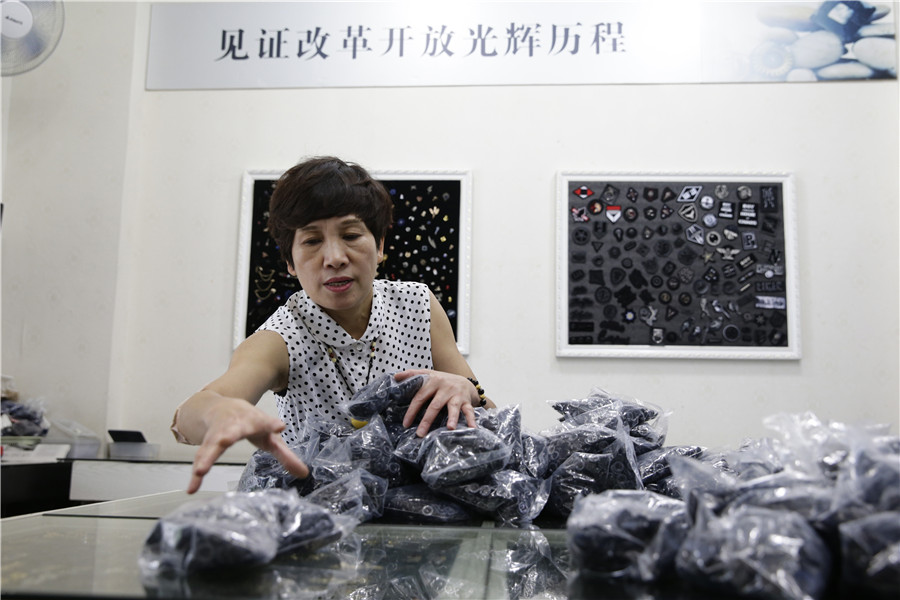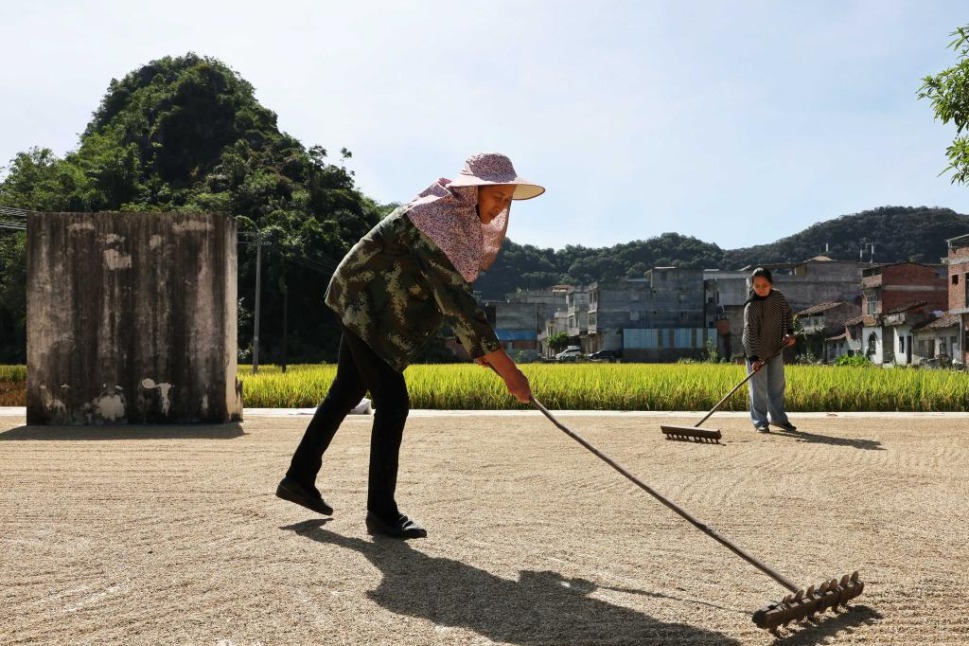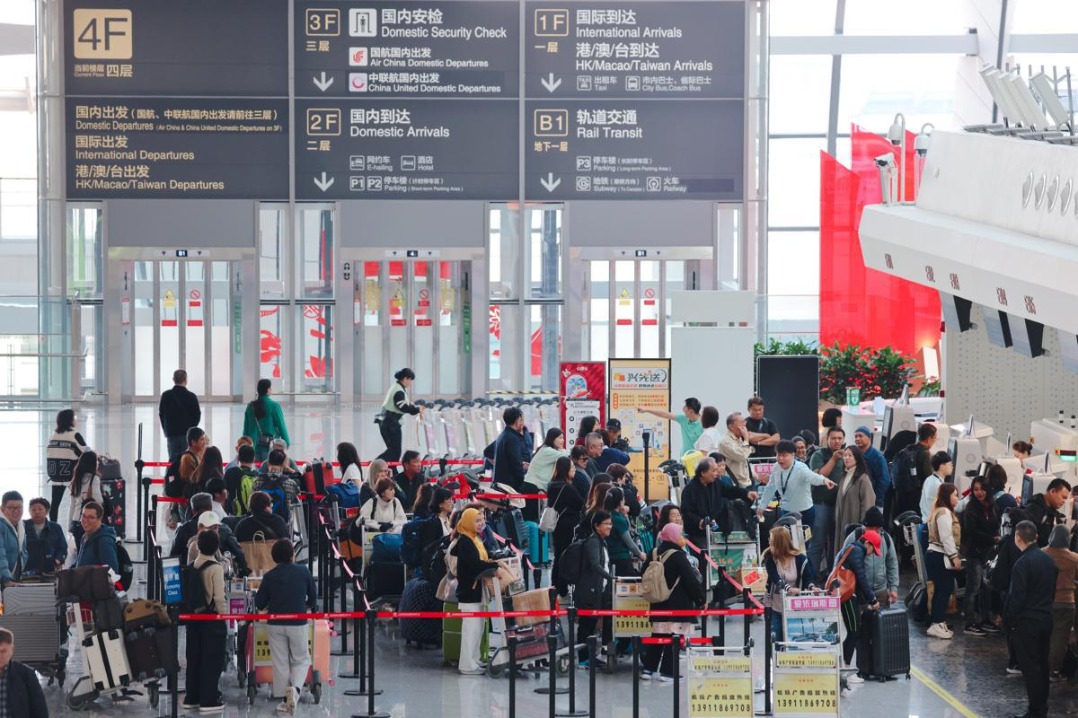Reform and opportunity are key ingredients to thrive


After decades of running her own business, Zhang Huamei, 58, from the Lucheng district in Wenzhou, Zhejiang province, plans to retire next year.
For the general manager of Wenzhou Huamei Garment Accessories Co Ltd, the years ahead will allow her to travel at leisure and enjoy life.
Zhang, who obtained the country's first permit to open a small private business in 1980, runs the company focusing on garment accessories with revenue of several million yuan per year.
She has decided to hand over the company, which was established in 2007 and has five workers, to her 34-year-old son Yu Shangjing next year.
She said the internet has essentially changed the old way of face-to-face transactions. "Now clients from many places contact us via QQ or WeChat (two popular instant messaging apps in China) and then make orders online. I am not good at the internet, but my son can do it," she said.
Yu said: "The younger generation can use our wisdom to explore new opportunities and my mom can have more of her own time."
Twists and turns
Back in 1978, Zhang was not able to find a job after graduation from primary school. One year later, she started to follow some of her neighbors who sold small commodities as street vendors. Several items, including buttons, memorial medals and watch straps, were all she could offer on her "shop"-a wooden table.
Then the 18-year-old was worried about being detained by government officials who often cracked down on speculative activities.
The location of her "shop", just outside her house, made it easy to flee any officials. "When knowing the officials were coming, I wrapped up everything and shut the door," she said.
In February 1979, the central government released the first report on individual private businesses, giving them legitimacy, signaling reforms and opening-up in the economic scenarios and bringing new opportunities for people like Zhang.
The next year, unemployed individuals with permanent residence were allowed to start repair services and make hand-made products, but they could not hire others.
"One day, at the end of 1979, an official of the local industry and commerce bureau came to me and said I could go for a permit. With that permit, I could be a legal vendor without any need to hide from government officials," Zhang said.
On Dec 11, 1980, Zhang received a business permit, equivalent to the current business licenses for shops. The document, labeled as Number 10101, was hand-written with a photo of the young woman on it.
It was a novelty for her parents and friends.
With the permit, Zhang cleared her sitting room to trade. Two years later, she halted the business in the end of 1982 following her marriage to Yu Xinguo, preparing for the birth of her baby.
However, it was beyond her imagination that the permit would have historical value. In 2013, it was categorized as a movable cultural relic by a national survey working group looking at such items.
Movable cultural relics are typically objects dating from various historical periods, such as works of art, documents, manuscripts and books.
In 1985, Zhang's family moved into a new apartment of around 40 square meters, which was purchased with 9,000 yuan ($1,300) borrowed from relatives and friends. The payment was 180 times that of the monthly salary of Yu Xinguo, who worked for a collectively-owned enterprise.
Under the pressure of debt, Zhang decided to restart her business to sell garment accessories in 1986. Within one year, the couple was able to pay off all the loans and became well-known in their communities with savings of more than 10,000 yuan, a huge sum in those days.
"At the dinner on the eve of the Spring Festival, we were extremely happy," the husband Yu said.
However, life always has complications. With ferocious competition in trading accessories, the couple decided to sell leather shoes.
But they paid dearly for their lack of experience in this field, and lost savings of more than 100,000 yuan in just one year and owed suppliers thousands of yuan.
In Zhang's dictionary, no word was more powerful than persistence.
The couple took a gamble and opened a shop in the China Qiaotou Button City in Wenzhou, which is a nationally-renowned trading center for small accessories. They rented a shop selling buttons in 1994.
In three years, Zhang and her husband repaid the loans and accumulated some new savings. In 1997, the couple shocked neighbors when they purchased a Volkswagen for 300,000 yuan, which was then considered a luxury item. From then on, her life was never again as hard as it used to be.
Thanks to opening-up
In 2007, she established the company to streamline operations.
When looking back at her career, Zhang attributed her success to the improving national policies of reform and opening-up and her own hard work.
"We benefited from the country's policy to open the market to private businesses and got rewards while being persistent," she said.
Indeed, over the past four decades, the government has been committed to building a better business environment with administrative streamlining and delegation of power to facilitate private businesses.
The Central Economic Work Conference, which concluded on Dec 21, pledged support to private businesses and enterprises with law-based environment and ensured personal and property safety for private entrepreneurs.
In the first three quarters of this year, new market entities rose sharply to hit 15.61 million, up by 10.4 percent compared with the same period in 2017, said the State Administration for Market Regulation in a news conference on Oct 26. During that period, each day saw an average of 57,200 new market entities registered, it said.
By the end of September, China had 106 million market entities, including more than 70 million non-enterprise entities such as small private businesses, the administration said.
Zhang said she did not expect such fundamental changes in China's business environment. "Private businesses were not allowed 40 years ago, and now the government encourages people to do more in innovation and entrepreneurship," she said.
In December 2016, Zhang was among more than 600 small private business owners to meet with Premier Li Keqiang at the Great Hall of the People in Beijing, the first such event in 25 years.
She said the premier talked to her and spoke highly of the role of small private business owners, which encouraged participants to continue their career, she said.
As to the future, Zhang is confident her son will make even greater achievements.
"The business environment is far better than that in the late 1970s and we, the old-generation, have accumulated wealth for successors. They should do better," she added.
- Unmanned system demonstration island in operation in Suzhou
- Beef up collaboration against global housing crisis
- Developing global AI governance framework highlighted at WLA forum
- China's AI boom sees new wave of applications
- Over 60% of China's population proficient in primary or higher digital skills
- Over 3.41m eligible for China's annual civil servant intake




































